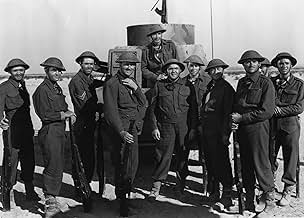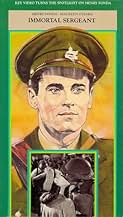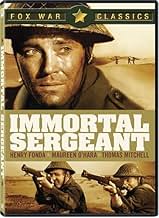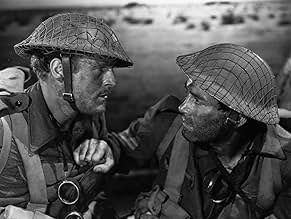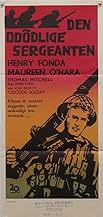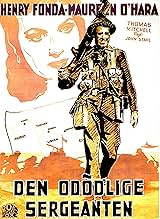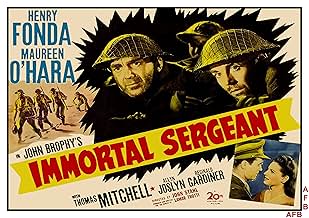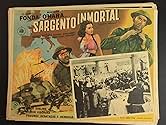IMDb RATING
6.6/10
1.1K
YOUR RATING
During a WW2 patrol in the North-African desert, a Canadian corporal reminisces about his sweetheart and must lead his platoon when the sergeant gets wounded.During a WW2 patrol in the North-African desert, a Canadian corporal reminisces about his sweetheart and must lead his platoon when the sergeant gets wounded.During a WW2 patrol in the North-African desert, a Canadian corporal reminisces about his sweetheart and must lead his platoon when the sergeant gets wounded.
- Awards
- 3 wins total
John Banner
- Officer
- (uncredited)
Wilson Benge
- Waiter
- (uncredited)
Lane Bradford
- Returning Soldier
- (uncredited)
James Carlisle
- Party Guest
- (uncredited)
Gordon B. Clarke
- Soldier
- (uncredited)
Ruth Clifford
- Nightclub Patron
- (uncredited)
James Craven
- NCO
- (uncredited)
Oliver Cross
- Nightclub Patron
- (uncredited)
Jack Deery
- Party Guest
- (uncredited)
- Director
- Writers
- All cast & crew
- Production, box office & more at IMDbPro
6.61.1K
1
2
3
4
5
6
7
8
9
10
Featured reviews
The Film That Won World War II?????
In his memoirs Henry Fonda hated this film above all others that he did in his career. That's taking in quite a bit of territory because Fonda did some dreadful stuff in the seventies like Tentaccoli with a giant octopus. A lot of this was done for the money and Fonda with five wives certainly had much expenses in alimony.
But Immortal Sergeant held a place dear in his heart because of the head of 20th Century Fox, Darryl F. Zanuck. Back in 1940 in order to get the part of Tom Joad, Fonda made a faustian deal with Zanuck signing his only studio contract. The studio cast him in what he considered junk. The good films he made in that four year stretch were on loan out, to Paramount for The Lady Eve, to Warner Brothers for The Male Animal, to RKO for The Big Street. He was not fond of what Fox cast him in for the most part because he got what was left after Tyrone Power and Don Ameche rejected it.
Anyway come 1943 Fonda had two objectives, to make The Oxbow Incident because he knew that would be a classic and to enlist in World War II as pal Jimmy Stewart did. He prevailed on Zanuck to do The Oxbow Incident and it was a cheaply made western, classic though it was because it was shot completely on the sound stage.
Then Zanuck cajoled, begged, and pleaded with him to make this one more film which he said was a great propaganda piece one that would tear the hearts of the movie going public and rally the homefront and be an inspiration to the fighting troops.
When Immortal Sergeant proved somewhat less than that, Fonda felt hoodwinked and gritted his teeth and finished the film. He tried in fact to enlist to get out of it and Zanuck had so much pull in Washington, DC, Fonda kept getting his enlistment postponed.
It was one angry Henry Fonda who finished The Immortal Sergeant and then went to war. His experience with this film made him bound and determined to get out of his contract one way or another. Ultimately he left Hollywood in 1948 when he got a great Broadway role in Mister Roberts. Fonda didn't return to Hollywood until 1955 and then to make the screen version of Mister Roberts.
But that's getting away from Immortal Sergeant. Without Henry Fonda's rather colored viewpoint of the situation let me say it's not the worst World War II flag waver the studios put out. As is usual Henry Fonda is a Canadian to explain his non-British speech who has enlisted in the British army and is serving in North Africa. He's a young man with a lot of angst and when his patrol's sergeant is killed, Fonda has to summon something from within to bring the men back to their lines.
Thomas Mitchell is the sergeant and Maureen O'Hara is Fonda's girl back home and both do a creditable job.
For the rest of his life Fonda would foam at the mention of Immortal Sergeant. Being the professional he was, he did a good job in the film.
But Immortal Sergeant hardly belongs in the same company as The Oxbow Incident and Mister Roberts in the works of Henry Fonda.
But Immortal Sergeant held a place dear in his heart because of the head of 20th Century Fox, Darryl F. Zanuck. Back in 1940 in order to get the part of Tom Joad, Fonda made a faustian deal with Zanuck signing his only studio contract. The studio cast him in what he considered junk. The good films he made in that four year stretch were on loan out, to Paramount for The Lady Eve, to Warner Brothers for The Male Animal, to RKO for The Big Street. He was not fond of what Fox cast him in for the most part because he got what was left after Tyrone Power and Don Ameche rejected it.
Anyway come 1943 Fonda had two objectives, to make The Oxbow Incident because he knew that would be a classic and to enlist in World War II as pal Jimmy Stewart did. He prevailed on Zanuck to do The Oxbow Incident and it was a cheaply made western, classic though it was because it was shot completely on the sound stage.
Then Zanuck cajoled, begged, and pleaded with him to make this one more film which he said was a great propaganda piece one that would tear the hearts of the movie going public and rally the homefront and be an inspiration to the fighting troops.
When Immortal Sergeant proved somewhat less than that, Fonda felt hoodwinked and gritted his teeth and finished the film. He tried in fact to enlist to get out of it and Zanuck had so much pull in Washington, DC, Fonda kept getting his enlistment postponed.
It was one angry Henry Fonda who finished The Immortal Sergeant and then went to war. His experience with this film made him bound and determined to get out of his contract one way or another. Ultimately he left Hollywood in 1948 when he got a great Broadway role in Mister Roberts. Fonda didn't return to Hollywood until 1955 and then to make the screen version of Mister Roberts.
But that's getting away from Immortal Sergeant. Without Henry Fonda's rather colored viewpoint of the situation let me say it's not the worst World War II flag waver the studios put out. As is usual Henry Fonda is a Canadian to explain his non-British speech who has enlisted in the British army and is serving in North Africa. He's a young man with a lot of angst and when his patrol's sergeant is killed, Fonda has to summon something from within to bring the men back to their lines.
Thomas Mitchell is the sergeant and Maureen O'Hara is Fonda's girl back home and both do a creditable job.
For the rest of his life Fonda would foam at the mention of Immortal Sergeant. Being the professional he was, he did a good job in the film.
But Immortal Sergeant hardly belongs in the same company as The Oxbow Incident and Mister Roberts in the works of Henry Fonda.
Bitter memories in worst heat of the war turning out unexpectedly well
It is not as good as "An Ice Cold in Alex" but next to it. It's the same kind of desperately desolate desert with no hope, no water, only the constant peril of the Germans, all lives constantly at stake, and some occasional actual fights. Most of the action takes place in the night, so you don't see much of the arid landscape, fortunately, and there are some moments of relief. The acting is superb by everyone, Thomas Mitchell above all as the sergeant, and Henry Fonda, as the corporal, while Maureen O'Hara sparkles in all her beauty only in flashbacks. These flashbacks actually constitute the main cinematic attraction of the film, because they show the ideal life dreamed about in times of wine and roses from the utter darkness of the abyss of the desperate war situation. It's a Great War film, and the last film Henry Fonda made before enlisting for the war himself.
Too Many Problems - Immortal Sergeant
Some films age well, while others get noticeably worse over the years. This film falls into the second category. First, we are asked to believe that Henry Fonda is British; please. Then, we have to subjected to Thomas Mitchell, one of the worst character actors in the history of film. He always played a mischievous Irishman; how creative.
Fonda is always good; regardless of his vehicles in film and Sullivan is believable (but not as a Brit).
The production crew made a few mistakes; like the desert being sweaty at night; it is cool in the desert at night, and unbearingly hot in the day.
This leads to a few other holes in the plot. After the crew attacks and kills a German crew, why didn't they take THEIR food and water? Duh.
Second error. Why not kill the Germans while they are sleeping instead of foraging for food and water? They would have been a lot easier to kill sleeping, rather than awake and walking around with their weapons. Sorry, no sale. Had very little to do with real desert warfare.
Fonda is always good; regardless of his vehicles in film and Sullivan is believable (but not as a Brit).
The production crew made a few mistakes; like the desert being sweaty at night; it is cool in the desert at night, and unbearingly hot in the day.
This leads to a few other holes in the plot. After the crew attacks and kills a German crew, why didn't they take THEIR food and water? Duh.
Second error. Why not kill the Germans while they are sleeping instead of foraging for food and water? They would have been a lot easier to kill sleeping, rather than awake and walking around with their weapons. Sorry, no sale. Had very little to do with real desert warfare.
Immortal Sergeant Lives On ***
Henry Fonda looks just like he appeared in 1940's "The Grapes of Wrath."
This is quite a good film detailing several soldiers caught in Africa during World War 11 and how they eventually overcome their perils.
Thomas Mitchell, as the old-time sergeant is a standout here. There is able support by Allyn Joslyn, Reginald Gardiner and others.
Maureen O'Hara is used mainly in flashbacks here as Fonda thinks back of his past while trying to lead his men to freedom.
The ending seems rushed up as Fonda wakes up in the hospital and is told how they got out of their predicament.
This is quite a good film detailing several soldiers caught in Africa during World War 11 and how they eventually overcome their perils.
Thomas Mitchell, as the old-time sergeant is a standout here. There is able support by Allyn Joslyn, Reginald Gardiner and others.
Maureen O'Hara is used mainly in flashbacks here as Fonda thinks back of his past while trying to lead his men to freedom.
The ending seems rushed up as Fonda wakes up in the hospital and is told how they got out of their predicament.
I liked this film more than my wife and Henry Fonda did.
"Immortal Sergeant" was apparently not one of Henry Fonda's favorite film roles. I am not sure why "The Big Street" wasn't his least favorite (it was god-awful, believe me) but he disliked it. And, I might add, my wife wasn't super-fond a this film as we watched it. However, I really thought it was pretty good...though I do wonder if the main character played by Fonda might have been schizophrenic--that's because throughout the film he keeps hearing the voice of his sergeant--even though the guy is dead!
The film is a WWII propaganda film. Because of this, it's main thrust is NOT realism but to bolster folks' support of the war effort. I cut the film a bit of slack, as it was 1943 and keeping up morale was a major concern. What I didn't like was the casting of Fonda, as he was supposed to be a Brit--and seemed about as British as John Wayne or Hattie McDaniel! In this sense, I could see why he didn't like playing this role--but the plot is pretty good and more than makes up for this.
The sergeant in the title is played by Thomas Mitchell--and he's very good in this role. This guy is a career soldier and seems indestructible to his men--and he is adored by them. However, although he seems to have all the answers, his corporal (Fonda) seems quite different--unsure of himself and not at all the soldier Mitchell is. But, when the sergeant is killed and Fonda is left in charge of a small group of men in the North African desert, he's given a chance to show his mettle.
In many ways, this film is a lot like the film "Sahara"--though "Sahara" is a much more enjoyable (and less realistic) film. Both are set in the same locale and are about a small group of soldiers overcoming greater numbers of enemy soldiers. But the casting and script just weren't quite as good here--though the film STILL is enjoyable and did what the studio wanted it to do. I also appreciate how the men in this film were NOT indestructible--many died even though you KNEW how it all had to end. Not brilliant but quite entertaining.
The film is a WWII propaganda film. Because of this, it's main thrust is NOT realism but to bolster folks' support of the war effort. I cut the film a bit of slack, as it was 1943 and keeping up morale was a major concern. What I didn't like was the casting of Fonda, as he was supposed to be a Brit--and seemed about as British as John Wayne or Hattie McDaniel! In this sense, I could see why he didn't like playing this role--but the plot is pretty good and more than makes up for this.
The sergeant in the title is played by Thomas Mitchell--and he's very good in this role. This guy is a career soldier and seems indestructible to his men--and he is adored by them. However, although he seems to have all the answers, his corporal (Fonda) seems quite different--unsure of himself and not at all the soldier Mitchell is. But, when the sergeant is killed and Fonda is left in charge of a small group of men in the North African desert, he's given a chance to show his mettle.
In many ways, this film is a lot like the film "Sahara"--though "Sahara" is a much more enjoyable (and less realistic) film. Both are set in the same locale and are about a small group of soldiers overcoming greater numbers of enemy soldiers. But the casting and script just weren't quite as good here--though the film STILL is enjoyable and did what the studio wanted it to do. I also appreciate how the men in this film were NOT indestructible--many died even though you KNEW how it all had to end. Not brilliant but quite entertaining.
Did you know
- TriviaAccording to TCM's Robert Osborne, this was the last film Henry Fonda worked on before enlisting in the U.S. Navy during World War II.
- GoofsThe two Germans on patrol at the oasis, when seen moving towards the CPL, are carrying their rifles slung over their right shoulder, but when they are shown a moment later, the rifles are at 'shoulder arms', on their right shoulder.
- Quotes
Sgt. Kelly: Drinking water is the worst thing in the world for a wound like mine.
[in the groin]
- ConnectionsEdited into All This and World War II (1976)
- SoundtracksThe Campbells Are Coming
(uncredited)
Traditional
Played on the bagpipes at the beginning
- How long is Immortal Sergeant?Powered by Alexa
Details
- Release date
- Country of origin
- Language
- Also known as
- Den odödlige sergeanten
- Filming locations
- Production company
- See more company credits at IMDbPro
- Runtime
- 1h 31m(91 min)
- Color
- Aspect ratio
- 1.37 : 1
Contribute to this page
Suggest an edit or add missing content


